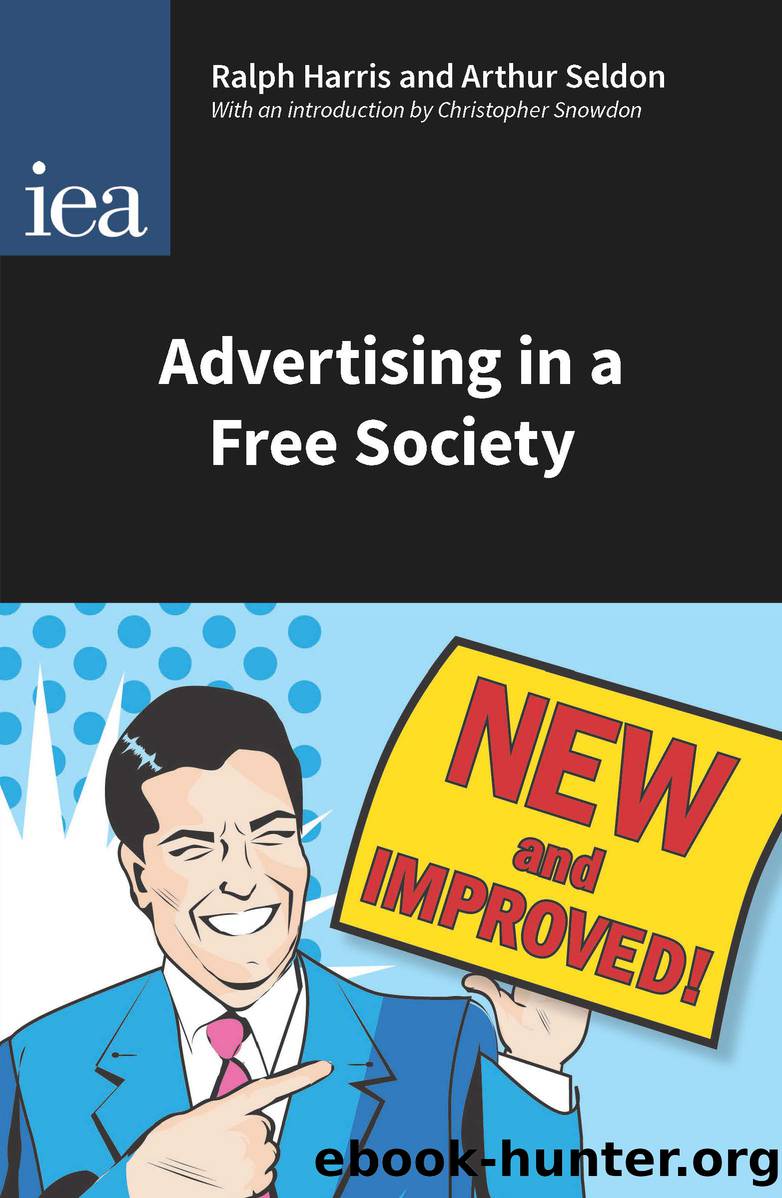Advertising in a Free Society by Harris Ralph;Seldon Arthur;Snowdon Christopher;

Author:Harris, Ralph;Seldon, Arthur;Snowdon, Christopher;
Language: eng
Format: epub
Publisher: London Publishing Partnership
Published: 2014-10-20T13:23:46+00:00
New wants
Whether advertising is instructive in itself, or not, its effect is informative if it leads people to buy and try a commodity or service they have not known before. In this sense the more persuasive the advertising, the more informative it is. The information comes to the consumer through his experience and trial of the product to which he is introduced; the information is indirect, but it is all the more certain because it is based on use of the product and not on mere description.
This argument is developed by Professor R. H. ÂCoase, who relates it to the theory of consumer choice and demand.3 He quotes in support Professor F. H. Knight, who wrote that âthe advertising, puffing or salesmanship, necessary to create a demand for a commodity is causally distinguishable from utility inherent in the commodity itselfâ (Knight 1921: 339). Moreover, the experience to which even persuasive advertising leads the consumer is not merely the satisfaction of existing wants but of new wants as yet unknown. Professor Knight again:
The chief thing that the commonsense individual actually wants is not satisfaction for the wants which he has, but more and better wants [â¦] all intelligently conscious activity is directed forward, onward, upward, indefinitely. Life is not fundamentally a striving for ends, but rather for bases for further striving; desire is more fundamental to conduct than is achievement, or better perhaps, the true achievement is the refinement and elevation of the plane of desire, the cultivation of taste [â¦] It is not life that man strives for, but a good life [â¦] For any practical, social purpose, beauty, play, conventionality, and the gratification of all sorts of âvanitiesâ, are more necessary than food and shelter.4
In short, advertising cannot be judged by whether it enables man to satisfy existing wants more effectively; it must be judged by its ability to create (or crystallise) new wants. This is its beneficent function, and its service to mankind.
Furthermore, the consumer may not wish to be bothered with the business of acquiring more information. Broadly, commodities are divisible into those which consumers like to buy after examination and comparison, and those which are bought by repute and name as sufficient evidence of performance or value. This distinction is roughly analogous to that made by economists between âshoppingâ goods, for which people like to âgo shoppingâ and, âconvenienceâ goods, which are bought usually by name at local shops. For many commodities the consumer wants information, and not merely to enable him to buy wisely but also because shopping and comparing and choosing is a positive pleasure in its own right, a hobby, a fancy, even a fad. Britain abounds in weekend gardeners, âdo-it-yourselfâ home decorators, car-tinkerers, television-takers-to-Âpieces, dog-lovers and pig-breeders, who, beginning as amateurs, become more expert than the expert. They insist on information before they buy; and they usually get it: indeed a whole series of periodicals has been developed to serve them.5
Download
This site does not store any files on its server. We only index and link to content provided by other sites. Please contact the content providers to delete copyright contents if any and email us, we'll remove relevant links or contents immediately.
Influence: The Psychology of Persuasion by Robert B. Cialdini(4601)
The Miracle Morning by Hal Elrod(4422)
The Hacking of the American Mind by Robert H. Lustig(4086)
Pre-Suasion: A Revolutionary Way to Influence and Persuade by Robert Cialdini(3977)
Unlabel: Selling You Without Selling Out by Marc Ecko(3471)
Ogilvy on Advertising by David Ogilvy(3332)
Hidden Persuasion: 33 psychological influence techniques in advertising by Marc Andrews & Matthijs van Leeuwen & Rick van Baaren(3292)
Purple Cow by Seth Godin(3069)
Who Can You Trust? by Rachel Botsman(3025)
Kick Ass in College: Highest Rated "How to Study in College" Book | 77 Ninja Study Skills Tips and Career Strategies | Motivational for College Students: A Guerrilla Guide to College Success by Fox Gunnar(2998)
This Is Marketing by Seth Godin(2905)
I Live in the Future & Here's How It Works by Nick Bilton(2844)
The Marketing Plan Handbook: Develop Big-Picture Marketing Plans for Pennies on the Dollar by Robert W. Bly(2796)
The Power of Broke by Daymond John(2775)
Building a StoryBrand by Donald Miller(2754)
The 46 Rules of Genius: An Innovator's Guide to Creativity (Voices That Matter) by Marty Neumeier(2678)
Draw to Win: A Crash Course on How to Lead, Sell, and Innovate With Your Visual Mind by Dan Roam(2639)
The Tipping Point by Malcolm Gladwell(2559)
Market Wizards by Jack D. Schwager(2540)
